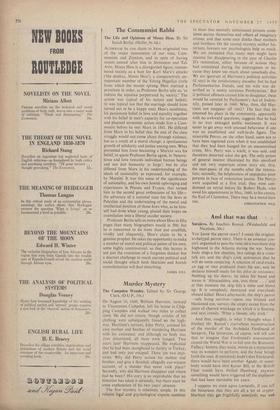The Communist Rabbi
The Life and Opinions of Moses Hess. By Sir Isaiah Berlin. (Heifer, 8s. 6d.) ALTHOUGH he can claim to have originated two of the major movements of our time, Com- munism and Zionism, and in spite of having streets named after him in Jerusalem and Tel- Aviv, Moses Hess is a disregarded figure, remem- bered mainly as a butt for Karl Marx's attacks (The donkey, Moses Hess'), a comparatively un- important member of the Young Hegelian circle from which the master sprang. Hess married a prostitute in order, as Professor Berlin tells us, 'to redress the injustice perpetrated by society.' The action was typical of his nature and beliefs; (it was typical too that the marriage should have turned out to be a happy one). Hess's saintliness, his passionate belief in love and equality together with his belief in men's capacity for co-operation and planned economic action Made him a Com- munist before he met Marx in 1841. He differed from Marx in his belief that the end of the class struggle would not come about through violence, but as a result of a moral change, a spontaneous growth of solidarity and justice among men. What prevented him from becoming a Marxist was his belief, to quote Professor Berlin again, in 'benevo- lence and love towards individual human beings and not just humanity at large'; but he also differed from Marx in his understanding of the ideals of nationality as expressed, for example, by Mazzini. It was this sense of the significance of nationality, and his own Jewish upbringing and experiences in Prussia and France, that turned him to the second great enthusiasm of his life— the advocacy of a national state for the Jews in Palestine and the undermining of the moral and intellectual position of those Jews who, as he him- self had done when young, placed their hopes on assimilation into a liberal secular society.
Professor Berlin tells us more about Hess in fifty pages than many biographers would in 500; but he is concerned to do more than just establish, vividly and eloquently, Hess's claim to be a genuine prophet. He takes the opportunity to make a number of moral and political points of his own, some highly controversial, so that this lecture is not just the evocation of a forgotten thinker but a discreet challenge to much current political and social thought which both Marxists and Jewish assimilationists will find disturbing.
JAMES JOLL


























































 Previous page
Previous page